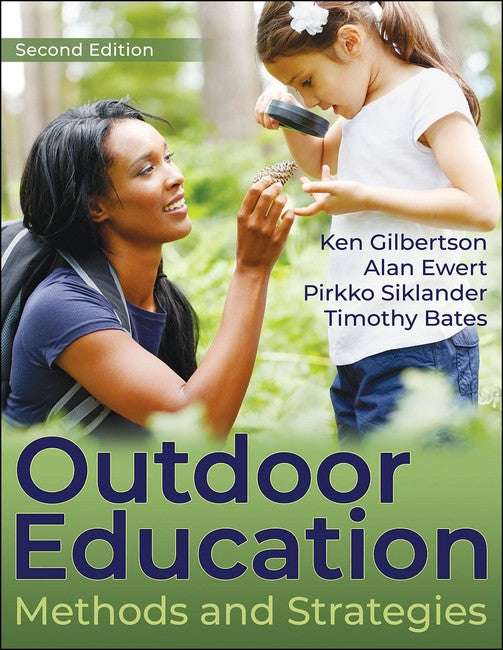Ken Gilbertson, PhD, is a professor of outdoor education in the department of applied human services at the University of Minnesota-Duluth (UMD), where he is also director of the Center for Environmental Education. He has more than 50 years of experience teaching outdoor and environmental education at the college level and has conducted wilderness education, taught at nature centers and Outward Bound wilderness schools, and educated a wide range of audiences through the UMD outdoor program. Gilbertson's specialty is in understanding how people learn and applying the methods that will best help them learn about the outdoors. He has designed and constructed a wilderness education curriculum, including a state-of-the-art kit that employs several learning theories. Gilbertson has received two outstanding faculty awards, has been honored with a UMD leadership scholarship in his name, and is a board member of numerous outdoor education and environmental committees. He also serves as reviewer for the Journal of Experiential Education and of abstracts for the Symposium on Experiential Education Research. Alan Ewert, PhD, is a professor emeritus at Indiana University, where he became the Patricia and Joel Meier Endowed Chair in Outdoor Leadership in 1998. A prolific scholar, Ewert has published articles in a variety of journals and books related to outdoor leadership and recreation. He continues his professional service through numerous venues, including his status as a fellow and past president of the Academy of Leisure Sciences and one of the founding editors of the International Journal of Wilderness. He serves on the editorial board of the Journal of Experiential Education. In 2021, he received the Theodore and Franklin Roosevelt Award for Excellence in Recreation and Park Research through the National Recreation and Park Association. He was the 1996 recipient of the Reynold E. Carlson Award for Distinction in Outdoor Environmental Education; the 2002 recipient of the J.B. Nash Scholar Award through the American Association for Leisure and Recreation; and the 2005 recipient of the Julian W. Smith Award through the American Alliance for Health, Physical Education, Recreation and Dance. Pirkko Siklander, PhD, is an adjunct professor and university researcher at the University of Oulu in Finland. Her main research interest deals with learning and teaching processes in technology-enhanced and collaborative learning, particularly on creative collaboration, triggers for raising interest, and playfulness. During the past 20 years, Siklander has researched and published several scientific articles and book chapters about playful learning and playful teaching, covering early childhood through advanced adulthood. She is an experienced teacher educator and a leader of the University of Oulu's learning, education, and technology (LET) master's degree program, which educates experts in the field of learning sciences and the use of technologies. Tim Bates, MEd, is the associate director and an environmental education coordinator in the recreational sports outdoor program at the University of Minnesota-Duluth, where he also serves as the assistant director of the Center for Environmental Education and as an adjunct faculty member in environmental and outdoor education. Bates has more than 35 years of experience teaching outdoor, environmental, and science education to people of all ages. In addition to developing curricula for schools and other organizations, he has been involved with the creation of an elementary school focused on environmental education and serves on numerous boards and committees related to the outdoors. His specialty is working with preservice students to help them understand and teach about the natural environment.
Request Academic Copy
Please copy the ISBN for submitting review copy form
Description
Part I. Foundations of Outdoor Education Chapter 1. Defining Outdoor Education Why the Outdoors? Model of Outdoor Education Environmental Education Interpretation Adventure Education Experiential Education Education Structure Development of Outdoor Education Rationale for Teaching Outdoors Summary Chapter 2. Describing the Outdoor Educator Professionalism Professional Responsibilities Summary Chapter 3. Learning Theories in Outdoor Education Theories in Outdoor Education Learning Theory Guiding Outdoor Education Experiential Education Constructivism Scaffolding Brain-Based Learning Environmental Learning Multiple Intelligences Playful Learning Theory Summary Part II. Preparation for Teaching Outdoors Chapter 4. Understanding Participants Audience Assessment Stereotyping Gender Age and Cognitive Development Medical Conditions Experience Group Familiarity Abilities Culture and Ethnicity Strategies for Teaching Diverse Audiences Summary Chapter 5. Creating the Learning Environment Foundations of the Learning Environment Components of Successful Learning Environments Summary Chapter 6. Outdoor Education Settings Site Selection Learning Barriers Equipment Logistics Record Keeping Special Settings: Lessons in the Night Summary Chapter 7. Designing Lessons Advantages of Lesson Plans Format Structure Assessment Summary Part III. Methods and Delivery of Outdoor Education Chapter 8. Physical Methods Physical Skills Development Physical Manipulation Activities, Games, and Competitions Theatrics Initiatives and Ropes Courses Summary Chapter 9. Cognitive Methods Lecture and Discussion Inquiry Videography Service Learning Supporting Materials Peer Teaching Summary Chapter 10. Affective Methods Guided Discovery Visual Imagery Storytelling Scenarios and Case Studies Summary Chapter 11. Sample Lessons Night Hike Navigation Maple Sugar Bush Weather Fishing Ethics Basic Techniques for Sea Kayaking Personal Growth Lighting a Camp Stove Nature Awareness Summary Chapter 12. Your Future in Outdoor Education Issues and Trends Affecting Outdoor Education Working With Mainstream Education State Standards and High-Stakes Testing Professional Certification Education or Advocacy? Emotional Needs of Participants Strategic Planning for Professional Growth Summary Appendix A. Professional Organizations in the United States and Internationally Appendix B. Sample Forms

